| David CRONENBERG |
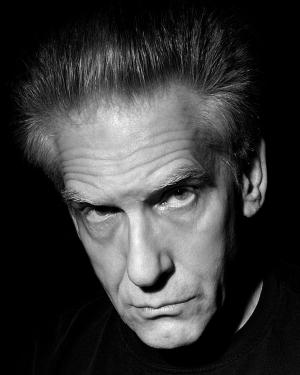 * 15.03.1943, Toronto, Kanada * 15.03.1943, Toronto, KanadaRegisseur * Zu David Cronenbergs Oeuvre als Drehbuchautor und Regisseur gehören folgende Filme: „Parasiten-Mörder“, „Rabid – Der brüllende Tod“, „10.000 PS – Vollgasrausch im Grenzbereich“, „Die Brut“, „Scanners – Ihre Gedanken können töten“, „Videodrome“, „Die Fliege“, „Die Unzertrennlichen“, „Naked Lunch“, „Crash“ und „eXistenZ“. Zu den Filmen, die er nach Drehbüchern anderer Autoren realisierte, zählen „The Dead Zone“, „M. Butterfly“, „Spider“, „A History of Violence“ – bei dem er auch als Produzent fungierte – und „Tödliche Versprechen - Eastern Promises“. Das Werk dieses aus Toronto stammenden Filmemachers hat ihm weltweit etliche Preise und große Anerkennung eingebracht. Im Juni 2001 wurde ihm von der University of Toronto der Ehrendoktortitel verliehen, 1990 erhielt er in Frankreich den Titel Chevalier of the Order of Arts and Letters, 1997 dann den Titel Officer of the Order of Arts and Letters. 2005 wurde er vom Magazin GQ zum „Mann des Jahres“ gewählt, erhielt auf dem Filmfestival in Palm Springs den Sonny Bono Award, vom National Board of Review den Billy Wilder Award und wurde auf dem Filmfestival in Stockholm mit dem Lifetime Achievement Award ausgezeichnet. Im Juli 2006 war er Gastkurator der Ausstellung „Andy Warhol/Supernova: Stars, Deaths and Disasters, 1962-1964“ an der Art Gallery in Toronto. Retrospektiven seines Werks wurden in Japan, den USA, Großbritannien, Frankreich, Brasilien, Italien, Portugal und Kanada gezeigt. Zu den Büchern über Cronenberg und seine Filme gehören The Shape of Rage – The Films of David Cronenberg, The Artist as Monster: The Cinema of David Cronenberg, Cronenberg on Cronenberg und eine Sammlung von Interviews, die von Cahiers du Cinema veröffentlicht wurde. Cronenberg studierte an der University of Toronto, wo er sich für Film zu interessieren begann und zwei 16-mm-Kurzfilme drehte: „Transfer“ und „From the Drain“. Seine ersten 35-mm-Filme waren „Stereo“ und „Crimes of the Future“, die beide Ende der 1960er Jahre entstanden. Schon in diesen Filmen lotete er einige der Themen und Anliegen aus, die seine spätere Arbeit so sehr prägen sollten, darunter Gewalt, Sexualität, Realität und verzerrte Wahrnehmung, Sozialsatire und biologischer Horror. Mitte der 70er Jahre avancierte sein erstes kommerzielles Horror-Movie „Parasiten-Mörder“ in Kanada schnell zum Kultfilm. Und so drehte Cronenberg innerhalb der nächsten Dekade bereits hochambitionierte Filme für große Hollywoodstudios, wie z.B. „Videodrome“ und „The Dead Zone“ - für den er beim Fantastic Film Festival von Avoriaz mit drei von fünf Preisen ausgezeichnet wurde, sowie sieben Edgar Allan Poe-Award-Nominierungen bekam. Sein nächster Film war „Die Fliege“, ein Remake des Horrorklassikers aus dem Jahr 1958, der mit dem Oscar in der Kategorie Bestes Make-Up ausgezeichnet wurde, und „Die Unzertrennlichen“ mit Jeremy Irons in der Hauptrolle, der Cronenberg den Preis der Los Angeles Critics Association in der Kategorie Beste Regie einbrachte. Cronenbergs „Naked Lunch“, adaptiert nach William S. Burroughs‘ Roman und Werken, brachte ihm den Preis der National Society of Film Critics in der Kategorie Beste Regie ein; vom gleichen Kritikerverband sowie vom New York Film Critics Circle wurde er außerdem in der Kategorie Bestes Drehbuch nominiert. „Naked Lunch“ wurde zudem mit insgesamt acht Genies (dem kanadischen Oscar) ausgezeichnet, darunter in den Kategorien Bester Film und Beste Regie. Für „Crash“ wurde Cronenberg 1996 auf den Filmfestspielen in Cannes mit dem Sonderpreis der Jury geehrt und bekam mehrere Genie Awards; „eXistenZ“ gewann 1999 auf der Berlinale den Silbernen Bären, und „Tödliche Versprechen - Eastern Promises“ mit Viggo Mortensen in der Hauptrolle erhielt etliche Preise und Auszeichnungen, darunter vom Village Voice Film Critics Poll in den Kategorien Beste Regie und Bester Film sowie zwei Oscar-Nominierungen. Zu seinen neuesten Kurzfilmen gehören „Camera“ und „At the Suicide oft he Last Jew in the Last Cinema of the World“, der für die Chacun son Cinema-Reihe zu Ehren des 60. Jubiläums der Filmfestspiele in Cannes gedreht wurde. In letztgenanntem Kurzfilm spielte Cronenberg selbst die Hauptrolle, genau wie in etlichen Filmen für andere Regisseure; er tritt gerne vor die Kamera um nach der Isolation des Drehbuchschreibens wieder Fühlung mit Dreharbeiten aufzunehmen. Zu seinen Filmen als Schauspieler zählen z.B. Gus Van Sants „To Die For“, Clive Barkers „Nightbreed“ und Don McKellars „Last Night“. 2008 führte Cronenberg bei einer neuen Oper Regie; die Inszenierung seines Films „Die Fliege“ wurde am Théatre du Chatelet in Paris sowie an der Los Angeles Opera aufgeführt. Howard Shore komponierte die Musik dazu, David Henry Hwang schrieb das Libretto. [Presseheft von Eine dunkle Begierde, 2011] Der in Toronto geborene Regisseur startete seine Filmkarriere in den 1970er-Jahren mit Splatterstreifen, die so verschroben waren, dass weder die Masse der Horrorfilmfreaks noch Kritiker viel mit ihnen anzufangen wussten. Das Etikett «Körper-Horror» haftete dem studierten Naturwissenschaftler seitdem an, und es ist das Thema, das Cronenberg bis heute umtreibt. Waren es zu Beginn explodierende Köpfe («Scanners»), grauenhafte Nachgeburten («The Brood») und ungeheure Genmutationen («The Fly»), so ist Cronenbergs «Körpersprache» heute subtiler, wenn auch nicht weniger amoralisch. Nach wie vor aber sind drastische Gewaltexzesse bei Cronenberg Programm, sind sie doch Zeichen für das revolutionäre Potenzial, das unkontrolliert im Körper schlummert und über das sich die Menschen üblicherweise mit der Idee des freien Willens hinwegzutrösten versuchen. [SRF, März 2013] |
| FILMS |
Stereo (1968-CDN) 65m-Experimentalfilm (08-11; 0011-F) Crimes of the Future (1969/70-CDN) 70m-Experimentalfilm (08-02; 0011-F) Shivers / The Parasite Murders (Parasiten-Mörder, 1974-CDN; R+B: David Cronenberg, K: Robert Saad, D: Paul Hampton, Joe Silver, Lynn Lowry & Barbara Steele) 87m-Horror (08-09; 7510) Rabid (Rabid - Der brüllende Tod, 1976-CDN; R+B: David Cronenberg, K: Rene Verzier, D: Marilyn Chambers, Frank Moore) 91m-Horror (11-12; 7704) Fast Company (10.000 PS - Vollgasrausch im Grenzbereich, 1978-CDN; R: David Cronenberg, B: Phil Savath, Courtney Smith, David Cronenberg, K: Mark Irwin, M: Fred Mollin, D: William Smith * Claudia Jennings & John Saxon) 91m-Drama (07-08; 7905) The Brood (Die Brut, 1978-CDN; R+B: David Cronenberg, K: Mark Irwin, M: Howard Shore, D: Oliver Reed * Samantha Eggar) 92m-Sci-Fi-Horror (11-12; 7906) Scanners (1979-CDN) (8101) Videodrome (Videodrome, 1981-CDN; R+B: David Cronenberg, K: Mark Irwin, M: Howard Shore, D: James Woods ° Sonja Smits & Deborah Harry) 87m-Sci-Fi-Thriller (10-12; 8302) The Dead Zone (Dead Zone, 1983-USA) (Roman von Stephen King) (01-03; 8310) The Fly (Die Fliege, 1985/86-USA; R: David Cronenberg, B: Charles Edward Pogue, David Cronenberg, K: Mark Irwin, M: Howard Shore, D: Jeff Goldblum, Geena Davis, John Getz) 96m-Horrordrama (Kurzgeschichte von George Langelaan, 1957) (12-02; 8608) Dead Ringers (Die Unzertrennlichen, 1988-CDN; R: David Cronenberg, B: David Cronenberg, Norman Snider, K: Peter Suschitzky, M: Howard Shore, D: Jeremy Irons * Genevieve Bujold) 115m-Psychothriller (Roman Twins von Bari Wood & Jack Geasland, 1977) (02-04; 8809) Naked Lunch (Naked Lunch - Nackter Rausch, 1991-GB/CDN) (Buch=Roman von William S. Burroughs) (9112) M. Butterfly (M. Butterfly, 1992-USA; R: David Cronenberg, B: David Henry Hwang, K: Peter Suschitzky, M: Howard Shore, D: Jeremy Irons * John Lone) 101m-Liebesdrama (Bühnenstück von David Henry Hwang, 1988) (08-12; 9310) Crash (Crash, 1995-CDN; R+B: David Cronenberg, K: Peter Suschitzky, M: Howard Shore, D: James Spader * Holly Hunter * Elias Koteas) 100m-Erotikgroteske (Buch=Roman von J.G. Ballard, 1973) (09-12; 9610) eXistenZ (eXistenZ, 1998-CDN/GB) (9904) Spider (Spider, 2001-CDN/GB; R: David Cronenberg, B: Patrick McGrath, K: Peter Suschitzky, M: Howard Shore, D: Ralph Fiennes * Miranda Richardson * Gabriel Byrne) 98m-Psychodrama (Roman von Patrick McGrath, 1990) (07-09; 0212) A History of Violence (2004-USA) (0509) Eastern Promises (2006/07-GB/CDN) (0709) A Dangerous Method / Eine dunkle Begierde (2010-D/CDN/GB) (1111) Cosmopolis (2011-CDN/F) (Roman von Don DeLillo) (1205) Maps to the Stars (2013-CDN/F/D; R: David Cronenberg, B: Bruce Wagner, K: Peter Suschitzky, M: Howard Shore, D: Julianne Moore, Mia Wasikowska, Olivia Williams, Evan Bird, Sarah Gadon, Niamh Wilson, Dawn Greenhalgh & John Cusack & Robert Pattinson) 111m-Drama (07-08; 1405-F) Crimes of the Future (Crimes of the Future, 2021-CDN/GR; R+B: David Cronenberg, K: Douglas Koch, M: Howard Shore, D: Viggo Mortensen * Léa Seydoux * Kristen Stewart, Scott Speedman) 107m-Horrordrama (08-09; 2206) The Shrouds / Les linceuls (The Shrouds, 2023-CDN/F; R+B: David Cronenberg, K: Douglas Koch, M: Howard Shore, D: Vincent Cassel ° Diane Kruger, Guy Pearce, Sandrine Holt) 119m-Horrorthriller (05-06; 2504) |
| AWARDS |
| Genie (beste Regie) für Videodrome (1984) Los Angeles Film Critics Association Award (beste Regie) für Dead Ringers (1988) Genie (beste Regie) für Dead Ringers (1989) Genie (bestes adaptiertes Drehbuch) für Dead Ringers (1989) New York Film Critics Circle Award (bestes Drehbuch) für Naked Lunch (1991) Genie (beste Regie) für Naked Lunch (1992) Genie (beste Regie) für Crash (1996) Genie (bestes adaptiertes Drehbuch) für Crash (1996) Genie (beste Regie) für Spider (2003) Billy Wilder Award [National Board of Review Awards 2005] |
| BOOKS |
In "The Fly," one of Seth Brundle's experiments goes disastrously wrong, and the chimpanzee he was attempting to transport from one telepod to the other ends up in the second device, a quivering mass of flesh; the process of teleportation has turned it inside out and yet it remains in unimaginable agony alive. David Cronenberg is undoubtedly one of the great directors of transgression, violating boundaries between the subjective and the objective and, even more spectacularly, between the human and the non-human. This collection of seven critical essays explores the multifaceted nature of Cronenberg's achievement and ranges from Jonathan Crane's reassessment of Cronenberg's place within horror cinema, to Parveen Adams' intensely focused discussion of "Crash." Other essays examine the place of the homoerotic body in Cronenberg's films; view "M. Butterfly" in relation to modern notions of literature; place the earlier work in its historical context; address the complexity and ambiguity derived from certain fundamental contrasts underpinning much of his work; and discuss some of the shortcomings of critical writings on Cronenberg. The book also includes a recent interview with the director together with a full filmography and bibliography. An important analysis for students and scholars of contemporary film and popular culture. > 217 S. : ill. |
Ever since his emergence from the Canadian cinematic underground during the late 1960s, David Cronenberg has challenged and disturbed audiences with works that range from cutting-edge commercial to cult-fave studies in "body horror" and existential despair. This collection of new interviews by critic Serge Grünberg examines Cronenberg from his career's uncertain beginnings through his ascendancy to master filmmaker. Cronenberg talks candidly about aesthetics, censorship, sexuality, the straightjacket of political correctness, and the ephemeral sense of reality in an age saturated with mass media. Each of his landmark films is discussed in detail, accompanied by stills, rare handbills and posters, and storyboards that show the creative process at work. Detailing both his textbook masterpieces - works like "Videodrome, Naked Lunch, and "The Fly - and his more edgy films such as the transsexual romance "M. Butterfly" and the bloody cyberpunk epic "Existenz", these interviews shed light on one of cinema's most talented and misunderstood creators. > 192 p. : ill. |
David Cronenberg is one of the most fascinating filmmakers in the world today. His provocative work has stimulated debate and received major retrospectives in museums, galleries, and cinematheques around the world. William Beard's The Artist as Monster was the first book-length scholarly work in English on Cronenberg's films, analyzing all of his features from Stereo (1969) to Crash (1996). In this paperback edition, Beard includes new chapters on eXistenZ (1999) and Spider (2002). Through close readings and visual analyses, Beard argues that the structure of Cronenberg's cinema is based on a dichotomy between, on the one hand, order, reason, repression, and control, and on the other, liberation, sexuality, disease, and the disintegration of self and of the boundaries that define society. The instigating figure in the films is a scientist character who, as Cronenberg evolves as a filmmaker, gradually metamorphoses into an artist, with the ground of liberation and catastrophe shifting from experimental subject to the self. Bringing a wealth of analytical observation and insight into Cronenberg's films, Beard's sweeping, comprehensive work has established the benchmark for the study of one of Canada's best-known filmmakers. > 550 pages |
For more than 30 years, David Cronenberg has produced films, mostly outside the Studio system, which continue to disturb, surprise and challenge audiences. He has also been repeatedly drawn to literary fiction for inspiration, adapting works by figures like William Burroughs, J.G. Ballard and Patrick McGrath. This book is only the second single-authored study on Cronenberg and as well as containing the first detailed analysis of eXistenZ (1999) Spider (2003) and A History of Violence (2005), it is the first to explore how understanding certain written texts, from both underground and mainstream fiction, can help us understand how Cronenberg`s films work. Cronenberg's literary aesthetic is discussed via the process of adaptation, not just in relation to overt source material but also writers such as Vladimir Nabokov, Angela Carter, Margaret Atwood, Brett Easton Ellis and Clive Barker. The book examines how Cronenberg’s literary influences function, particularly in terms of narrative structures and suggests the nature of their importance for Cronenberg in his conception of the director as auteur. It also considers the current state of adaptation studies and the need to move beyond conventional psychological frameworks in film analysis more broadly and Cronenberg's work in particular. > 206 pages |
David Cronenberg has moved from the depths of low-budget exploitation horror to become one of North America's most respected movie directors. Since the early 1970s, the softly-spoken Baron of Blood has attracted widespread controversies with a steady stream of shocks - sex-crazed parasites in Shivers (1975), exploding heads in Scanners (1981), revolutionary flesh technology in Videodrome (1983), mutating bugs in The Fly (1986), car crash scars in Crash (1996) and psychopathic bursts of gun fire in A History of Violence (2005). This new study provides an overview of Cronenberg's films in the light of their international reception, placing them firmly in the cultures they influenced. It also highlights often-ignored works, such as the race movie Fast Company (1979), and includes a chapter on the latest film Eastern Promises (2007). Amidst bans and boos, Cronenberg has developed a consistent cult following for his chronicles of humankind's struggle with its ever-changing environment, bugged by technology and changing social roles - becoming a hero of contemporary popular culture. * Introduction: Cinema, reality and what to make of it - Exploration and experimentation: Stereo and Crimes of the future - Revolution and rage: Shivers and Rabid - Cars and races: Fast company and The Italian machine - Cult curio: The brood and Scanners - Politics and paranoia: Videodrome and The dead zone - Science and progress: The fly and Dead ringers - Muses and machos: Naked lunch and M. Butterfly - Scars and wrecks: Crash - Cues and clues: eXistenZ and Spider - Family affairs: A history of violence and Eastern promises. > vii, 312 p. : ill. |
Initially regarded as a cult figure with a strong following amongst sci-fi and horror film fans, Canadian filmmaker David Cronenberg emerged as a major and commercially viable film director with mainstream hits such as A History of Violence (2005) and Eastern Promises (2007). With his unique ability to present imagery that is both disturbing and provocative, Cronenberg creates striking films, noteworthy not just for their cinematic beauty but also for the philosophical questions they raise. The Philosophy of David Cronenberg examines Cronenberg’s body of work, from his breakthrough Scanners (1981) through his most recognizable films such as The Fly (1986) and more recent works. Editor Simon Riches and a collaboration of scholars introduce the filmmaker’s horrific storylines and psychologically salient themes that reveal his pioneering use of the concept of “body horror,” as well as his continued aim to satirize the modern misuse of science and technology. The Philosophy of David Cronenberg also explores the mutation of self, authenticity and the human mind, as well as language and worldviews. While Cronenberg’s films have moved from small-market cult classics to mainstream successes, his intriguing visions of humanity and the self endure. * Simon Riches is a researcher at the Institute of Psychiatry, King’s College London. He previously taught philosophy at University College London and Heythrop College, University of London. He holds a PhD in philosophy from University College London and has also studied philosophy at the University of Southampton and psychology at the University of East London. His research interests lie in epistemology and the philosophy of psychology. He is a contributing author in UPKY’s The Philosophy of David Lynch. > vi, 224 p. |
| home © midas 07/2020 |
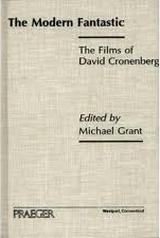 Michael Grant [Hg.]: The Modern Fantastic: The Films of David Cronenberg. Westport: Praeger, 2000
Michael Grant [Hg.]: The Modern Fantastic: The Films of David Cronenberg. Westport: Praeger, 2000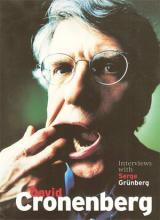 Claudine Paquot [Hg.]: David Cronenberg: Interviews with Serge Grünberg. London: Plexus, 2006
Claudine Paquot [Hg.]: David Cronenberg: Interviews with Serge Grünberg. London: Plexus, 2006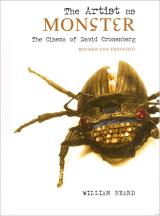 William Beard: The Artist As Monster: The Cinema of David Cronenberg. Toronto/Buffalo/London: University of Toronto Press, 2006
William Beard: The Artist As Monster: The Cinema of David Cronenberg. Toronto/Buffalo/London: University of Toronto Press, 2006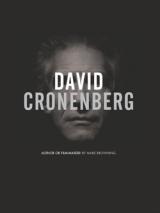 Mark Browning: David Cronenberg: Author or Film-maker?. Bristol: Intellect Books/Chicago: Intellect, 2007
Mark Browning: David Cronenberg: Author or Film-maker?. Bristol: Intellect Books/Chicago: Intellect, 2007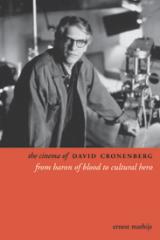 Ernest Mathijs: The Cinema of David Cronenberg: From Baron of Blood to Cultural Hero. London/New York: Wallflower Press, 2008
Ernest Mathijs: The Cinema of David Cronenberg: From Baron of Blood to Cultural Hero. London/New York: Wallflower Press, 2008 Simon Riches [Hg.]: The Philosophy of David Cronenberg. Lexington: University Press of Kentucky, 2012
Simon Riches [Hg.]: The Philosophy of David Cronenberg. Lexington: University Press of Kentucky, 2012